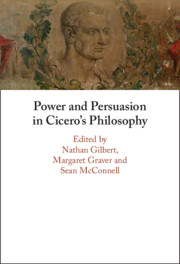Book contents
- Power and Persuasion in Cicero’s Philosophy
- Power and Persuasion in Cicero’s Philosophy
- Copyright page
- Contents
- Contributors
- Note on Texts and Translations
- Introduction
- Part I Techniques and Tactics of Ciceronian Philosophy
- Part II Political Philosophy and Ethics
- Chapter 6 Iuris consensu Revisited
- Chapter 7 The Psychology of Honor in Cicero’s De re publica
- Chapter 8 Cicero on the Justice of War
- Chapter 9 Towards a Definition of Sapientia
- Chapter 10 Old Men in Cicero’s Political Philosophy
- References
- Index Locorum
- General Index
Chapter 6 - Iuris consensu Revisited
from Part II - Political Philosophy and Ethics
Published online by Cambridge University Press: 15 January 2023
- Power and Persuasion in Cicero’s Philosophy
- Power and Persuasion in Cicero’s Philosophy
- Copyright page
- Contents
- Contributors
- Note on Texts and Translations
- Introduction
- Part I Techniques and Tactics of Ciceronian Philosophy
- Part II Political Philosophy and Ethics
- Chapter 6 Iuris consensu Revisited
- Chapter 7 The Psychology of Honor in Cicero’s De re publica
- Chapter 8 Cicero on the Justice of War
- Chapter 9 Towards a Definition of Sapientia
- Chapter 10 Old Men in Cicero’s Political Philosophy
- References
- Index Locorum
- General Index
Summary
In book I of De re publica Cicero famously defined the res publica as res populi, the business or the interest of the people, and then went on to flesh out what we should understand to constitute a people: ‘a collection of a great number of human beings, joined in partnership through agreement or unanimity of law or justice or right (iuris consensu) and through sharing in advantage (utilitatis communione)’. ‘Sharing in advantage’ seems clear enough. But my disjunctive rendering of iuris consensu, with its repeated ‘or’ and unconvincing ‘of’, is intended to give an indication of the difficulty translators and other interpreters have had in grasping what Cicero meant by the expression. This chapter offers a fresh attempt at the problem.
- Type
- Chapter
- Information
- Power and Persuasion in Cicero's Philosophy , pp. 119 - 139Publisher: Cambridge University PressPrint publication year: 2023
- 1
- Cited by



